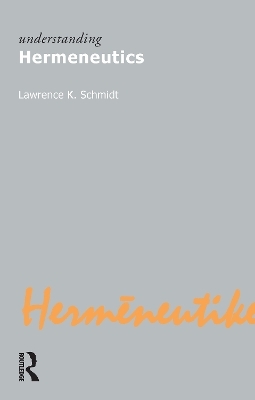
Understanding Hermeneutics
Seiten
2006
Acumen Publishing Ltd (Verlag)
978-1-84465-077-4 (ISBN)
Acumen Publishing Ltd (Verlag)
978-1-84465-077-4 (ISBN)
Provides an introduction to the major schools, movements and traditions in philosophy and the history of ideas since the beginning of the Enlightenment. This work presents an introduction to modern hermeneutics through an examination of the ideas of its key philosophical proponents.
This series provides short, accessible and lively introduction to the major schools, movements and traditions in philosophy and the history of ideas since the beginning of the Enlightenment. All books in the series are written for undergraduates meeting the subject for the first time. Hermeneutics concerns itself with the theory of understanding and the interpretation of language. The question of how to correctly interpret and understand others remains one of the most contested branches of philosophy. In Understanding Hermeneutics Lawrence Schmidt provides an introduction to modern hermeneutics through a systematic examination of the ideas of its key philosophical proponents. Chapter 1 examines the ideas, of the Protestant theologian, Friedrich Schleiermacher, who argues that misunderstanding is always possible so we must always employ interpretation if we are to understnad correctly. Chapter 2 discusses the ideas of Dilthey, who maintains that understanding in the humanities is fundamentally different from explanation in the natural sciences, and who presents a methodology to judge what another person means or feels by means of their language and also their gestures, facial expressions, and manners of acting. Chapter 3 explores the ideas of Heidegger who radicalizes the concept by shifting its focus from interpreting texts to an existential interpretation of human being. In Chapter 4 the recent ideas of Gadamer are examined, which extend to examining the structures of hermeneutic experience and to question the supremacy of the natural sciences as models for truth. The final chapters consider some of the criticisms and controversies surrounding hermeneutics, including the work of Habermas, Hirsch, Ricoeur and Derrida, and the prospects for the future of hermeneutics.
This series provides short, accessible and lively introduction to the major schools, movements and traditions in philosophy and the history of ideas since the beginning of the Enlightenment. All books in the series are written for undergraduates meeting the subject for the first time. Hermeneutics concerns itself with the theory of understanding and the interpretation of language. The question of how to correctly interpret and understand others remains one of the most contested branches of philosophy. In Understanding Hermeneutics Lawrence Schmidt provides an introduction to modern hermeneutics through a systematic examination of the ideas of its key philosophical proponents. Chapter 1 examines the ideas, of the Protestant theologian, Friedrich Schleiermacher, who argues that misunderstanding is always possible so we must always employ interpretation if we are to understnad correctly. Chapter 2 discusses the ideas of Dilthey, who maintains that understanding in the humanities is fundamentally different from explanation in the natural sciences, and who presents a methodology to judge what another person means or feels by means of their language and also their gestures, facial expressions, and manners of acting. Chapter 3 explores the ideas of Heidegger who radicalizes the concept by shifting its focus from interpreting texts to an existential interpretation of human being. In Chapter 4 the recent ideas of Gadamer are examined, which extend to examining the structures of hermeneutic experience and to question the supremacy of the natural sciences as models for truth. The final chapters consider some of the criticisms and controversies surrounding hermeneutics, including the work of Habermas, Hirsch, Ricoeur and Derrida, and the prospects for the future of hermeneutics.
Lawrence K. Schmidt is Professor of Philosophy at Hendrix College, Arkansas.
Abbreviations Introduction: what is hermeneutics? 1. Schleiermacher's universal hermeneutics 2. Dilthey's hermeneutic understanding 3. Heidegger's hermeneutic ontology 4. Hermeneutics in the later Heidegger 5. Gadamer's theory of hermeneutic experience 6. Gadamer's ontological turn toward language 7. Hermeneutic controversies Questions for discussion and revision Further reading Index
| Erscheint lt. Verlag | 26.10.2006 |
|---|---|
| Verlagsort | Durham |
| Sprache | englisch |
| Maße | 138 x 216 mm |
| Gewicht | 294 g |
| Themenwelt | Geisteswissenschaften ► Philosophie ► Erkenntnistheorie / Wissenschaftstheorie |
| Geisteswissenschaften ► Philosophie ► Sprachphilosophie | |
| ISBN-10 | 1-84465-077-4 / 1844650774 |
| ISBN-13 | 978-1-84465-077-4 / 9781844650774 |
| Zustand | Neuware |
| Haben Sie eine Frage zum Produkt? |
Mehr entdecken
aus dem Bereich
aus dem Bereich
die Grundlegung der modernen Philosophie
Buch | Softcover (2023)
C.H.Beck (Verlag)
18,00 €
Buch | Softcover (2023)
Reclam, Philipp (Verlag)
7,00 €

![Was heißt Denken?. Vorlesung Wintersemester 1951/52. [Was bedeutet das alles?] - Martin Heidegger](/media/113619842)
